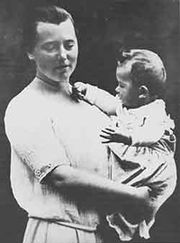For May’s science women, I want to focus on someone who didn’t get the full recognition she deserved. If you look up the wikipedia summary of Hilde Mangold (1898-1924), you’ll find that she’s described as
a German embryologist who was best known for her 1923 dissertation which was the foundation for her mentor, Hans Spemann’s, 1935 Nobel Prize in Physiology or Medicine for the discovery of the embryonic organizer,[ “one of the very few doctoral theses in biology that have directly resulted in the awarding of a Nobel Prize”
… Now, let’s think about that for a minute. Hilde’s dissertation work was so well done and such a new and unique study that it was worthy of a Nobel Prize. However that Nobel Prize was awarded to her advisor.

Hilde had a passion for learning, whether it was art history or chromosomes. She would plow through books and then be eager to share her new knowledge with others. When she started her PhD she was given the task of turning hydra – apparently, that’s a tiny polyp – inside out. This project was essentially attempting to replicate the work of another scientist and ultimately was little more than tedious, tricky work. Eventually this project proved to be too difficult for even her advisor and Hilde pushed for a new one. This is where she began her work understanding the “organizer” of cells that later lead to her ground breaking dissertation.
Hilde was persistent and dedicated. Her hard work resulted in experiments that lead to a new epoch in developmental biology. However, her advisor’s name was listed first on her work. There are rationalizations for why he did this, including that the work was contentious and others would be skeptical. However given that his other, male, advisees were free to publish their work on their own as first authors, it is hard to not agree with Hilde’s frustration at his interference. Even so, ultimately this work earned her advisor a Nobel Prize 12 years the completion of Hilde’s dissertation. I wonder if things might have gone differently for her if she had been present to advocate for herself but unfortunately she died just a year after finishing this work when a gas heater exploded in her kitchen.
What more could she had done in her life? What other discoveries could she have made? We’ll never know, but it is important to give her the recognition she deserves for the pivotal work she was able to accomplish so early in her career.

Thank you for bringer her to our attention. I imagine this has been a somewhat common occurrence through the years – a teacher getting credit for their students’ work – would you agree? I’m hoping it is not happening now, and that it has never happened to you!
Frustrating how often people will take credit for another person’s work (particularly women). Hers was obviously ground breaking. Makes you wonder if there are other Nobel Prize winners that really owe their recognition to someone else. Thanks for sharing a bit about her. It’s sad she died early.
Thanks, for bringing this woman and her accomplishments to our attention. I think it’s just rotten her advisor took her thunder. She should have gotten credit for her discovery and her contribution to society.
https://pics.me.me/avogato-avogato-arent-time-zones-amazing-in-australia-its-tomorrow-36710584.png